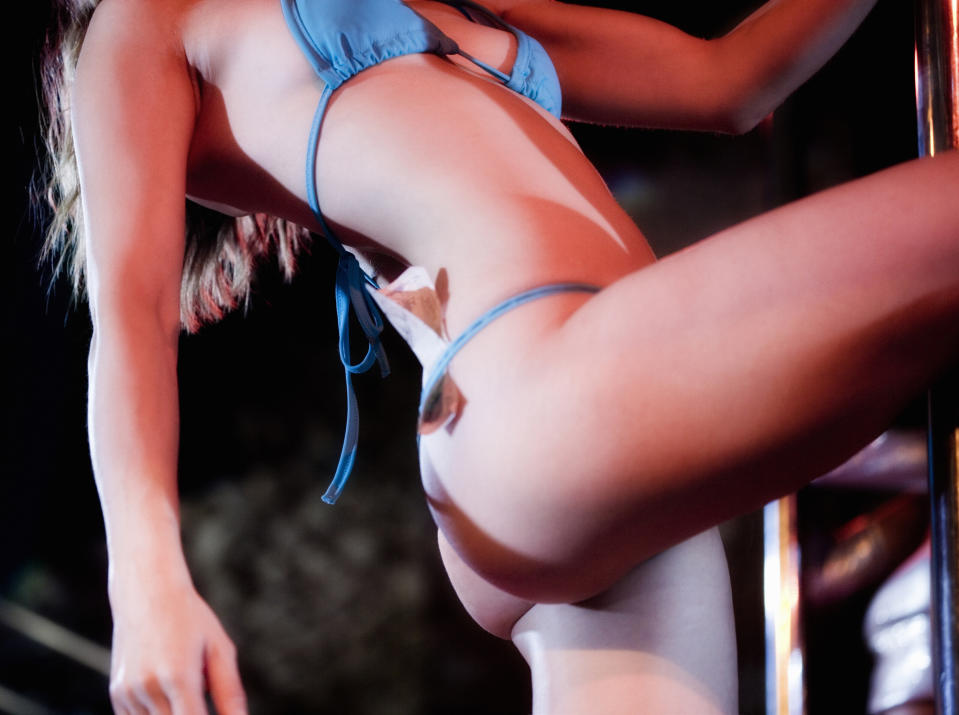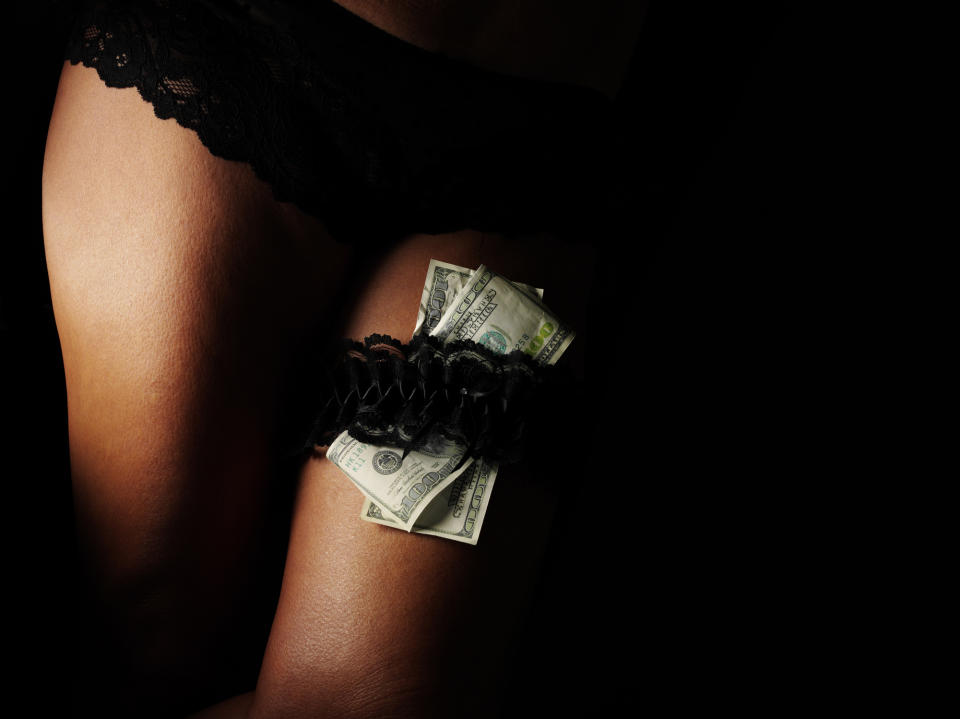6 Things I Learned From My Time Working As a Stripper

I started working as a stripper when I was a 19-year-old sophomore in college living abroad in Mexico. One day, I was out of cash, and my credit card hit its limit at the grocery story. That next night, I walked into a strip club with an older man who could translate for me and pleaded for a job. I wasn't beautiful or even particularly pretty, but I was a female, I was willing, and I need the money. Moreover, I was a white American - in Mexico, that's a hot commodity - and I was young. I got the job.
I worked as a stripper on and off for the next five years, and briefly worked as a call girl, as a way of supporting myself while in school. After graduating, I became a public elementary school teacher until, in 2010, I lost my job for speaking publicly about my time as a sex worker. Since then, you can imagine, I've thought a lot about my past. I'm not proud of having worked in the sex industry, but I'm not ashamed either - particularly of my time as a pole dancer. Over a decade later, I've realized that I've learned quite a lot from the experience.
1. Anyone Can Be a Stripper
Maybe you're picturing a 6'2'' Amazonian blonde with DDD breasts. Sure, there are girls that look like this. But that wasn't me, particularly when I first started. I was 5'3'', slim, small-chested with mousy brown hair and a round Cabbage Patch doll face for which I had been teased about as a child. I looked more like the girl next door than your typical porn star.
Nor were my coworkers. In Mexico, I worked alongside women of all shapes and sizes, from all backgrounds, each with their own story. Many were mothers, supporting their children the way they knew how.
When I returned home to Ohio, I still needed money, and so I continued to dance. I started working at a strip club near my college called Leroy's, where my coworkers' appearances were even more varied. Short, tall, skinny, fat, blonde, redhead, brunette - they had it all. In a club like Leroy's, where sexy came in every size made, I felt more comfortable with my own body. Cellulite and small tits, no matter, I loved to dance - and my enthusiasm paid off. The girls who made the most money in the club weren't necessarily the most conventionally attractive. Often, it was the funniest girl or the girl that was most clever - the one who could drink like one of the boys or knew tricks like how to smoke a cigarette out her puckering asshole - that brought home the most cash.
2. Stripping Is Work
Before becoming a stripper, I'd worked in fast food. I'd worked in retail. I was a checkout girl at the grocery store. I'd stuffed envelopes after school. One summer, I even sold singing telegrams. And stripping was the hardest job I ever had. Dancing eight hours nonstop in six-inch heels is exhausting. Whether you're getting paid or not, it is exhausting to listen to men talk mostly about themselves. Being nice and sweet in the face of anything required a special patience. As much if not more than other jobs I'd worked, exotic dancing required skills. I had to be a dancer, a marriage counselor, an actress, and more. I still enjoyed the work, mostly, but whether I enjoyed it or not, I did it for the money...much like any other job. And like most jobs - it became increasingly routine.

3. But It's Not Like Any Other Job
For one, there's a stigma. It took years to cop to how the stigma associated with sex work affected me. The fact that sex workers were presumed to be victims and associated with drug use, mental illness, disease and violence - assumptions that may or may not be true - these are things that in college, I could only implicitly acknowledge.
Besides that, there's the emphasis that sex work puts on one's sexual value. As a stripper, I came to see men differently. I started trusting them less, fearing men were all only interested in "one thing". Deep down, I began to fear that my sex appeal was the most valuable thing I had to offer. Blame late nights in the club, combined with the greedy, fucked-up feeling you get when you're being paid in cash, but I began to pay less attention to my studies; earning money became all-consuming.
And then there's the one unfortunate difference that I rarely considered: A sex worker is more likely to be touched, groped, kissed, raped, and, yes, even killed, than a woman working any other profession. Yes, sexual harassment happens to women in all professional fields - and all women are at risk of violence - but in a society that shows them the least respect, a sex worker bears a particular burden.
4. It Can Erode Your Self-Esteem
How many jobs make you feel compelled to hide them from people close to you? While I worked in the industry, I kept my job a secret from my family and closest friends. That came in tandem with the fact that I unleashed an alter ego when I took to the stage, an alter ego my friends and family did not know. The people who loved me most and knew me best - why, I thought guiltily to myself, they don't know me at all. However, after a year or two in the industry, I was becoming less like myself and more the character I performed on stage. Even in my off-time, I was always performing - I wasn't being true to myself.
That performance had a huge effect on me. By my senior year of college, I was working at high-end gentlemen's clubs in Manhattan where all the girls had a certain look - a look that I'd begun to work for subconsciously. I started going tanning. I dyed my brown hair blonde. In the lights of the club, it glowed a strange violet. Dissatisfied with my figure, I started taking diet pills. I no longer felt young. I lost my enthusiasm. Although I never seriously considered getting plastic surgery, I had considered it - which seems crazy to me now. At twenty-one years old, I knew that I had a fantastic body. But night after night in a strip club, even fantastic wasn't enough.
5. More Money Won't Necessarily Solve Your Problems
I started stripping because I'd grown up poor and I desperately needed money. Yet, to my dismay, my well-paying profession didn't solve my financial problems. I came to learn that I didn't know how to spend wisely. I didn't know to save. My attitude was "easy come, easy go." As a stripper, I was rolling in cash, but still lacking in financial literacy.
And then there was the emotional tax of working in the sex industry, which compelled me spend even more. Looking back, I see it felt like "dirty money" that I was eager to get rid of. I spent my earnings on stuff I didn't need, trying to make myself feel better. I didn't know how to practice self-care. When it came time to quit dancing, the money was all gone and all I was left with was confusion. I was sorry for lying to my loved ones and unsure of who I was. I wanted to leave the industry, but I wasn't sure how. I had convinced myself no other job would pay me what stripping did. Sex work, I feared, was all that I was good for.

6. Just Because a Workplace Has Normalized Harassment Doesn't Mean It's OK
It took years to register the subtle and overt harassment I brushed off when I worked as a stripper. Men routinely broke club rules and crossed my personal boundaries. And I experienced the same kind of piggish behavior from men in my "real" life. In non-sex work professional settings, I've had bosses coyly tell me to wear a skirt next time, the shorter the better. Like most women, I've been verbally harassed just for walking down the street. I've been propositioned by professors. I've gone on dates with men confused by the word "no". Having worked in the sex industry, I'd gotten used to excusing this behavior as normal. I learned to let nothing get under my skin. "Tough to the core" remained my attitude for years after I exited in the industry. I was resilient - which I'd argue is a good thing - and, yet, my tolerance for pain kept me from speaking up. It took leaving the sex industry, and a lot of therapeutic work, to begin to heal.
Still, I have no regrets. I may not be able to use my degree in childhood education as a result of the stigma associated with sex work, but I use my other Masters degree - in creative writing - often. And I have that undergraduate degree in Sociology and Women's Studies, thanks entirely to stripping. Working in the sex industry funded my education...and it served as an education in and of itself.
Follow Redbook on Facebook.
You Might Also Like

